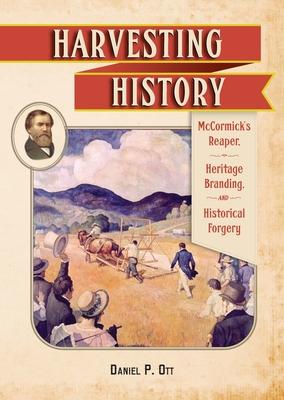Harvesting History explores how the highly contentious claim of Cyrus McCormick’s 1831 invention of the reaper came to be incorporated into the American historical canon as a fact. Spanning the late 1870s to the 1930s, Daniel P. Ott reveals how the McCormick family and various affiliated businesses created a usable past about their departed patriarch, Cyrus McCormick, and his role in creating modern civilization through advertising and the emerging historical profession. The mythical invention narrative was widely peddled for decades by salesmen and in catalogs, as well as in corporate public education campaigns and eventually in history books, to justify the family’s elite position in American society and its monopolistic control of the harvester industry in the face of political and popular antagonism.
As a parallel story to the McCormicks’ manipulation of the past, Harvesting History also provides a glimpse of the nascent discipline of history during the Progressive Era. Early historians were anxious to demonstrate their value in the new corporate economy as modern professionals and "objective" guardians of the past. While ethics might have prevented them from being historians for hire, their own desire for inclusion in the emerging middle class predisposed them to be receptive to the McCormicks’ financial influence as well as their historical messages.| FindBook |
有 1 項符合
Harvesting History: McCormick’’s Reaper, Heritage Branding, and Historical Forgery的圖書 |
 |
Harvesting History: McCormick’’s Reaper, Heritage Branding, and Historical Forgery 作者:Ott 出版社:University of Nebraska Press 出版日期:2023-01-01 語言:英文 規格:精裝 / 300頁 / 普通級/ 初版 |
| 圖書館借閱 |
| 國家圖書館 | 全國圖書書目資訊網 | 國立公共資訊圖書館 | 電子書服務平台 | MetaCat 跨館整合查詢 |
| 臺北市立圖書館 | 新北市立圖書館 | 基隆市公共圖書館 | 桃園市立圖書館 | 新竹縣公共圖書館 |
| 苗栗縣立圖書館 | 臺中市立圖書館 | 彰化縣公共圖書館 | 南投縣文化局 | 雲林縣公共圖書館 |
| 嘉義縣圖書館 | 臺南市立圖書館 | 高雄市立圖書館 | 屏東縣公共圖書館 | 宜蘭縣公共圖書館 |
| 花蓮縣文化局 | 臺東縣文化處 |
|
|
圖書介紹 - 資料來源:博客來 評分:
圖書名稱:Harvesting History: McCormick’’s Reaper, Heritage Branding, and Historical Forgery
|











